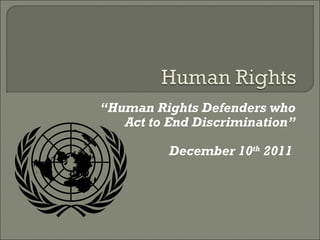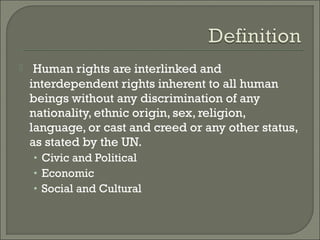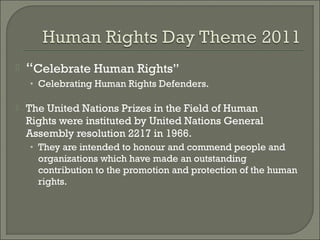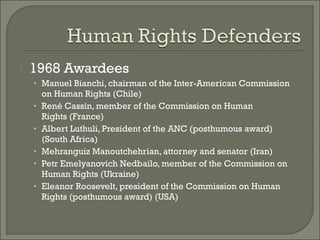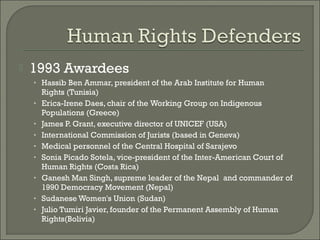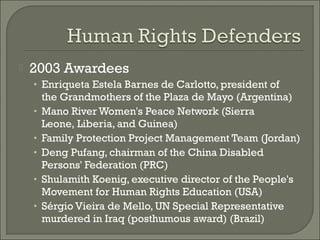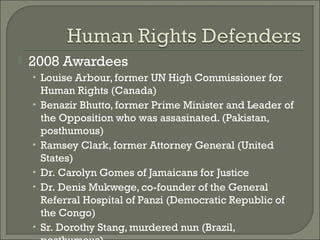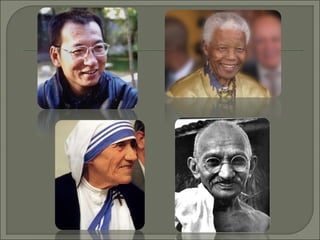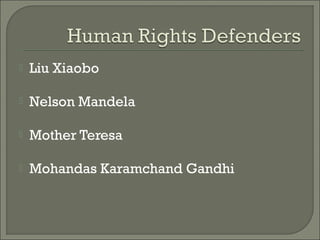Human rights
- 1. “Human Rights Defenders who Act to End Discrimination” December 10th 2011
- 2. Human rights are interlinked and interdependent rights inherent to all human beings without any discrimination of any nationality, ethnic origin, sex, religion, language, or cast and creed or any other status, as stated by the UN. • Civic and Political • Economic • Social and Cultural
- 3. The UDHR was adopted by the United Nations General Assembly on December 10th 1948 at Palais de Chaillot, Paris. The UDHR consists of 30 articles which have been elaborated in subsequent international treaties, regional human rights instruments, national constitutions and laws. • The International Bill of Human Rights • International Covenant on Economic, Social and Cultural Rights • International Covenant on Civil and Political Rights
- 5. On December 4th 1950 All states and interested organizations were invited to mark December 10th as Human Rights. As such December 10th of each following year was marked as Human Rights Day. Each year a new theme is observed, which is celebrated worldwide in a variety of ways. Main focus to educate persons about their rights as humans.
- 6. “Celebrate Human Rights” • Celebrating Human Rights Defenders. The United Nations Prizes in the Field of Human Rights were instituted by United Nations General Assembly resolution 2217 in 1966. • They are intended to honour and commend people and organizations which have made an outstanding contribution to the promotion and protection of the human rights.
- 7. 1968 Awardees • Manuel Bianchi, chairman of the Inter-American Commission on Human Rights (Chile) • René Cassin, member of the Commission on Human Rights (France) • Albert Luthuli, President of the ANC (posthumous award) (South Africa) • Mehranguiz Manoutchehrian, attorney and senator (Iran) • Petr Emelyanovich Nedbailo, member of the Commission on Human Rights (Ukraine) • Eleanor Roosevelt, president of the Commission on Human Rights (posthumous award) (USA)
- 8. 1973 Awardees • Taha Hussein, professor of literature (Egypt) • C. Wilfred Jenks, director-general of the International Labour Office (posthumous award) (UK) • María Lavalle Urbina, lawyer and lecturer (Mexico) • Abel Muzorewa, president of the ANC (Namibia) • Seewoosagur Ramgoolam, prime minister of Mauritius (Mauritius) • U Thant, UN secretary-general (Myanmar)
- 9. 1978 Awardees • Begum Ra'Ana Liaquat Ali Khan (Pakistan) • Prince Sadruddin Aga Khan (Iran) • Martin Luther King (posthumous award) (USA) • Helen Suzman (South Africa) • International Committee of the Red Cross • Amnesty International • Vicaría de la Solidaridad (Chile) • Union nationale des femmes de Tunisie (Tunisia)
- 10. 1988 Awardees • Baba Amte, human rights lawyer (India) • John Peters Humphrey, director of the United Nations Division of Human Rights (Canada) • Adam Lopatka, president of the Supreme Court (Poland) • Leonidas Proaño, bishop (Ecuador) • Nelson Mandela, lawyer and statesman (South Africa) • Winnie Mandela, medical social worker (South Africa)
- 11. 1993 Awardees • Hassib Ben Ammar, president of the Arab Institute for Human Rights (Tunisia) • Erica-Irene Daes, chair of the Working Group on Indigenous Populations (Greece) • James P. Grant, executive director of UNICEF (USA) • International Commission of Jurists (based in Geneva) • Medical personnel of the Central Hospital of Sarajevo • Sonia Picado Sotela, vice-president of the Inter-American Court of Human Rights (Costa Rica) • Ganesh Man Singh, supreme leader of the Nepal and commander of 1990 Democracy Movement (Nepal) • Sudanese Women's Union (Sudan) • Julio Tumiri Javier, founder of the Permanent Assembly of Human Rights(Bolivia)
- 12. 2003 Awardees • Enriqueta Estela Barnes de Carlotto, president of the Grandmothers of the Plaza de Mayo (Argentina) • Mano River Women's Peace Network (Sierra Leone, Liberia, and Guinea) • Family Protection Project Management Team (Jordan) • Deng Pufang, chairman of the China Disabled Persons' Federation (PRC) • Shulamith Koenig, executive director of the People's Movement for Human Rights Education (USA) • Sérgio Vieira de Mello, UN Special Representative murdered in Iraq (posthumous award) (Brazil)
- 13. 2008 Awardees • Louise Arbour, former UN High Commissioner for Human Rights (Canada) • Benazir Bhutto, former Prime Minister and Leader of the Opposition who was assasinated. (Pakistan, posthumous) • Ramsey Clark, former Attorney General (United States) • Dr. Carolyn Gomes of Jamaicans for Justice • Dr. Denis Mukwege, co-founder of the General Referral Hospital of Panzi (Democratic Republic of the Congo) • Sr. Dorothy Stang, murdered nun (Brazil,
- 15. Liu Xiaobo Nelson Mandela Mother Teresa Mohandas Karamchand Gandhi

